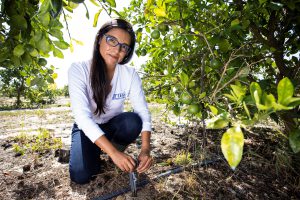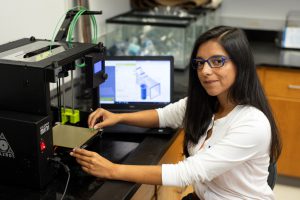
Stationed at UF/IFAS Indian River Research and Education Center (UF/IFAS IRREC) in Fort Pierce, Sandra Guzmán is an assistant professor whose research and extension work are all about water and how to conserve it. She applies precision irrigation technologies for the management of water resources in specialty crops, data analysis from field devices, and translation of technology to implementation in the Indian River district.
Her published works appear in industry magazines and UF/IFAS’s Electronic Document Information System (EDIS), also known as Ask IFAS UF/IFAS’ peer-reviewed journal. Guzmán scientific contributions has been published in the Water Resources Management, Agricultural Systems, and Environmental Modeling and Assessment journals. Her integrated research and extension projects have been featured in Citrus Industry magazine.
For Guzmán, her path to becoming an award-winning scientist using artificial intelligence (AI) began when her parents encouraged her at an early age to pursue science—long before AI became a popular scientific field.
Guzmán reflects on her life, her work at UF/IFAS IRREC and Hispanic Heritage Month.
Guzmán’s early life and Hispanic heritage
Guzmán was born in Bogotá, Colombia. She has two younger siblings.
“Although I am from the city, most of my family, including grandparents, aunts and uncles, are from a town near Bogota called Carmen de Carupa,” she said. “This is an indigenous town name that translates to ‘rock flower.’”
“During school breaks, I visited often enjoying mountain hikes with my family and watching for the espeletia, or as we call it in Colombia, the ‘frailejon’ plant. This plant is pivotal in mountain ecosystems as they as it contributes to the creation of water.”
The perennial plant, found in high altitudes is well known for contributing to water sustainability by capturing water vapor from passing clouds in its spongy trunk and releasing it through the roots into the soil. This helps to create vast, high-altitude subterranean water deposits and lakes that will eventually form rivers.
“Since I was a child, my family taught me the importance of preserving frailejones to keep rivers healthy and its role in agriculture to promote water conservation,” she said.

A journey that led to science
Guzmán credits her love of science to her parents.
“My parents were the ones who showed me the path to science. Although they did not finish high school, they believed in the value of science, creativity and innovation as the tools to move forward societies,” she said. “They showed me a path of exploring and discovering and this path is the key in science.”
“I remember that I wanted to become a marine biologist when I was a child,” she said. “Funny enough, I went to the ocean for the first time after my twenties, but building things became a thing for me later and that’s how I discovered my current career,” said Guzmán.
Guzmán obtained her bachelor’s and master’s degrees in agricultural engineering from the National University of Bogotá Colombia.
She came to the United States in 2013 as a visiting research assistant for the department of landscape architecture and civil engineering at Mississippi State University. Later, she obtained her doctoral degree in agricultural and biological engineering.
A look at the Guzmán work and laboratory
Guzmán started her appointment at IRREC as an assistant professor of agricultural and biological engineering at IRREC in November 2018.
Her lab team’s work benefits consumers, communities and growers in a variety of ways, and artificial intelligence is a key component.
“My research team developed a centralized application for irrigation management called IrrigMonitor. This application serves as a centralized display that integrates multiple sensor data from an array of brands and generations and allows practical assessment of irrigation needs and timing,” explained Guzmán. “IrrigMonitor is built with data curation and AI on the background to ensure interconnectivity between sensors without making displays complicated.”
This research provides growers with easy-to-use solutions for precision irrigation scheduling, said Guzman.
“Having decision support systems and applications such as IrrigMonitor makes the day-to-day water management activities in the field easier and reduces the burden of managing multiple sensors and apps to get information for irrigation scheduling.”
“Meanwhile, with the incorporation of AI in IrrigMonitor, it will make it possible to see more comprehensive predictions of the water conditions on fields. The predictions from IrrigMonitor allow users to visualize irrigation timing scenarios based on the day-to-day water movement across the soil, plant and environment.”
A recipient of various grants, and several professional and academic awards, Guzmán has served as a co-principal investigator for a grant in precision irrigation which was supported by both Colombia’s National Learning Service and the U.S. Department of State.
Celebrating Hispanic heritage
“What I value most about Hispanic heritage is the happiness and sense of responsibility and accountability we embody. These are values in any Hispanic family, regardless of our many ethnic backgrounds,” Guzmán said.
“I celebrate it with music, food and being with family. This year, I had the opportunity to celebrate with my research family here at UF/IFAS IRREC. We shared food and exchanged recipes.”
Check out photos from the celebration shared on Twitter. https://twitter.com/Cano_Lab/status/1570508273857744899?s=20&t=BSyBOUIyizPMCt86oCu-5Q
Para acceder a esta comunicación en español, por favor utilice este enlace.
###
By Lourdes Mederos, rodriguezl@ufl.edu
ABOUT UF/IFAS
The mission of the University of Florida Institute of Food and Agricultural Sciences (UF/IFAS) is to develop knowledge relevant to agricultural, human and natural resources and to make that knowledge available to sustain and enhance the quality of human life. With more than a dozen research facilities, 67 county Extension offices, and award-winning students and faculty in the UF College of Agricultural and Life Sciences, UF/IFAS brings science-based solutions to the state’s agricultural and natural resources industries, and all Florida residents.
 2
2
